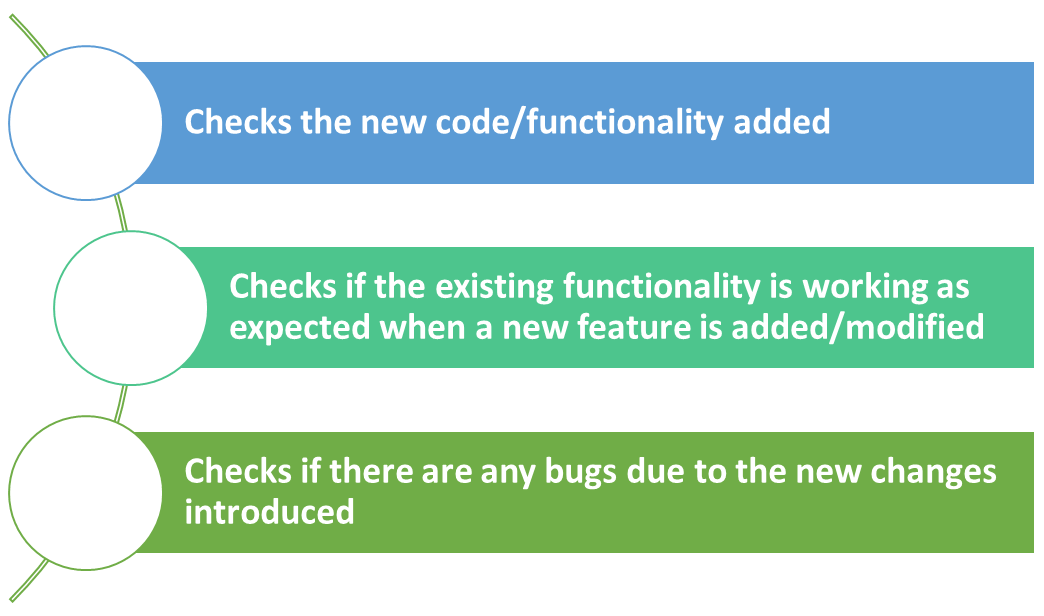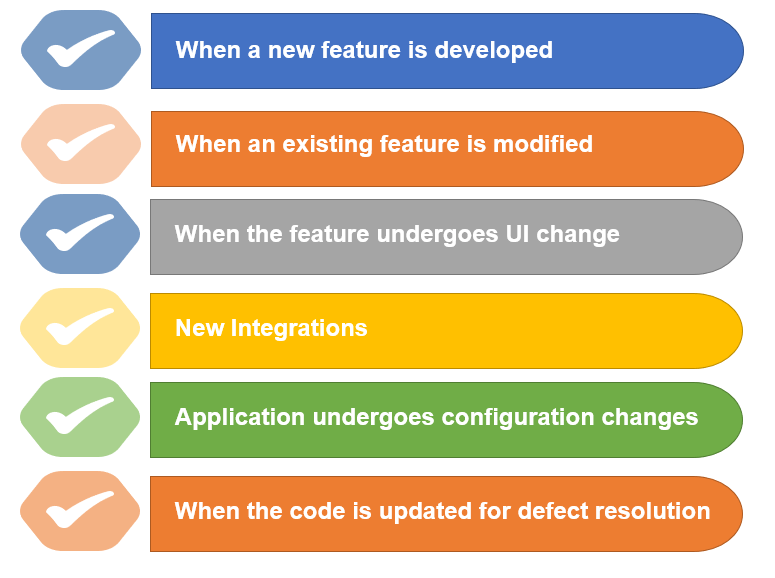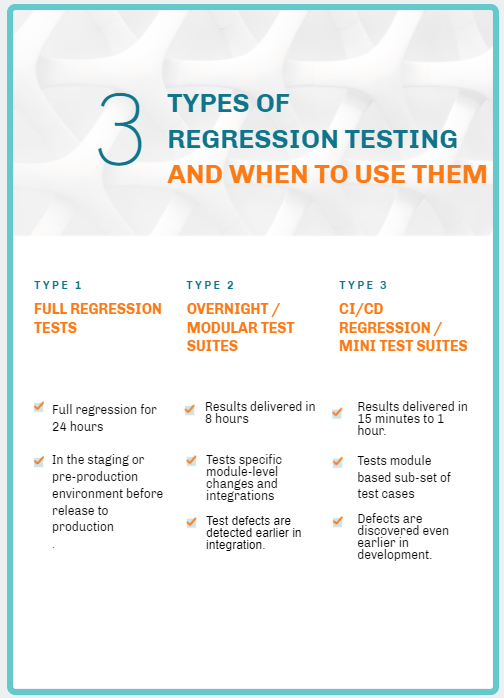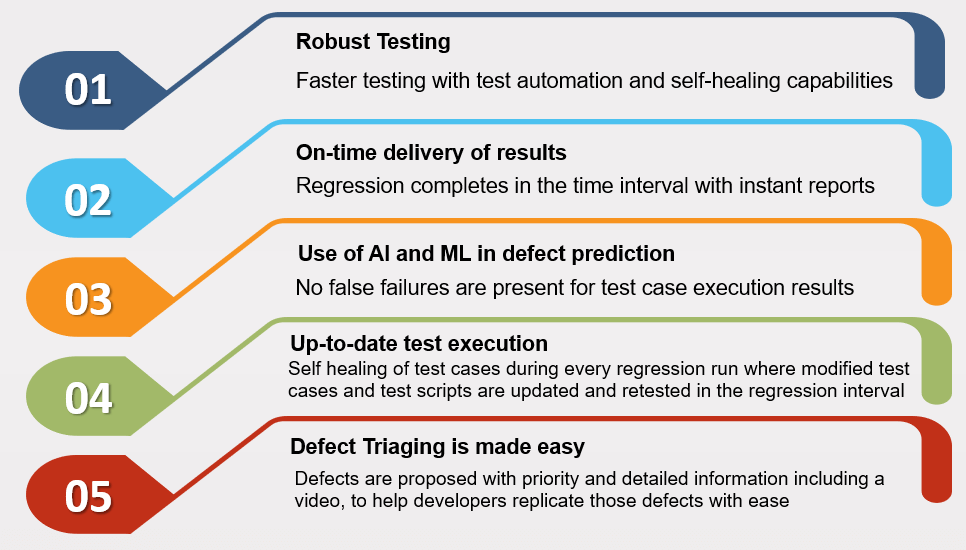Accelerate Success with AI-Powered Test Automation – Smarter, Faster, Flawless
Start free trialA Deep Dive into Regression Testing
It’s a strange conundrum that most teams live with. They know how much testing is crucial for a successful release but still neglect it. And when the defects get too high, they try to cope with the mess with limited and occasional testing.
In this fast-paced and ever-advancing IT industry, organizations are looking to continually grow and focus on being both product and user centric. Today’s systems are highly complex and integrated. Today’s customers are always on-the-go with the need for instant and personalized solutions. All this makes Quality Assurance paramount.
But Quality Assurance is not just simply testing your code at the end of the development lifecycle. It’s a continuous process of determining whether your application meets the requirements.
BUT… Requirements keep changing. New features are added everyday. Errors are found and fixed. New systems are integrated with the existing ones. With so many changes happening, how do you ensure that your application is working as expected? That’s where Regression testing comes in.
Regression testing is re-running functional and non-functional tests to ensure that previously developed and tested software still performs after a change.
Regression Testing:

What Happens if You Miss Out on Regression Testing
You know how exercise is critical for your overall health and well-being. But we still give it a miss due to lack of time and other priorities. The result – takes a toll on your energy and fitness.
Regression Testing is also treated in a similar fashion. Teams know they need to do a thorough regression testing, but end up neglecting it. The result – is frequent software breaks and periodic disruptions, and the teams go into a state of panic ultimately leading to a loss in revenue and brand reputation.
Let’s see in detail what can happen if we miss out Regression Testing:
- False sense of quality – Working on new feature developments in a short sprinted Agile framework and releasing them to the end users with limited regression leads to Low Production Quality and customers’ dissatisfaction.
- Bug creeps and Increased defects due to limited testing – New feature release processes outpace the regression test cycles as a result of which the defects keep increasing.
- Match the speed of the Agile development team – The number of changes in the testing code is proportional to the changes made by the developer in the application. The testing teams can’t match the speed resulting in Outdated Date Test Cases & Suite

When do You Need Regression Testing?

3 Types of Regression Testing and When to Use Them
The process of regression testing includes selecting the right test cases, and determining the testing frequency and types of regression required to be carried out. Amid ongoing market dynamism and growth, it is important to scale up and improve the overall quality.
Webomates Testing-as-a-Service platform brings quality and innovation to your business. You will love the value it brings to you to meet your changing requirements. Moving from Waterfall to Agile means you must be quick – in development and testing. Harnessing the power of Artificial Intelligence and Machine Learning technologies to provide accelerated Testing services is one of Webomates’ forte.

With all teams working in an agile CI/CD model, Webomates helps you scale up by getting build checks done via the below regression services that provide the maximum quality.
1. Full Regression in Staging Environment
Every build goes through a full regression for 24 hours in the staging or pre-production environment before release to production. All test cases are healed where necessary and then executed. Exploratory testing is carried out in tandem with test case-based testing. Regression frequency is aligned with the development build release cycle.
2. Overnight / Modular Test Suites Regression in Integration environment
Overnight regression was used to test specific module-level changes and integrations with results delivered in 8 hours with a modified test package. Test cases that changed due to a defect fix or feature change were also validated. By using such targeted software regression, test defects were detected earlier in integration.
3. CI/CD Regression / mini test suites in Developer environment
Webomates used CI/CD regression to test module based sub-set of test cases with results delivered in 15 minutes to 1 hour. Using pure automation and the patented AI Defect predictor, defects were discovered even earlier in development
And as the full regressions and modular tests include healing of the test cases and test scripts for modified features, the test suite is near UpToDate at all times. With such stringent code quality checks, the overall code quality will improve hence ensuring a more stable end-product is delivered to the customer. Webomates ensures to have a working, tested, validated product feature increment.
Three Minutes to Kick off Regression – and Opulence of Benefits
The platform is really quick in initiating the regression in just 3 minutes based on the regression type, platforms, attaching the release notes, and the target environment selected.
When it comes to Testing, Webomates – a cloud-based Testing as a Service platform powered by AI, is placed in a unique position. Webomates has extensive expertise in transforming the testing process by offering quality testing services with defined differentiators that none of the current testing providers can match.
Whatever your needs, our AI tools like Defect Predictor can potentially lower the testing risks and costs, while maximizing business value. It can help streamline the testing process and ensure your success. The platform dramatically increases the speed and efficiency of your team along with the below benefits that give you a compelling value proposition:

Together, all these benefits and innovative tools have a transformative impact on the quality of testing.
Webomates Testing-as-a-Service is near effortless to deploy. Take a look at this animation and know the three easy steps you can take to AI automate your application.
Interested in Finding Out More?
Webomates patented tools and services are leading the way in application testing. These testing types have received high recognition from the customers and have always resulted in successful releases and improving time to market. To find out more about what Webomates Intelligent Testing services can do for your business, get In touch with us today.
Please click here and schedule a demo, or reach out to us at info@webomates.com.
Read Next
Regression Testing & Its Importance
Regression Testing on Hotfixes: Save your Software being a Titanic
Add Security Testing with Complete Regression Test
Key differences between Functional Testing and Non-Functional Testing
Tags: Automation Testing, intelligent testing, Regression Testing, TaaS, Testing as a service

Leave a Reply